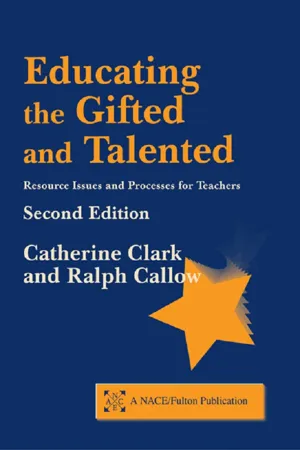
Educating the Gifted and Talented
Resource Issues and Processes for Teachers
- 164 pages
- English
- ePUB (mobile friendly)
- Available on iOS & Android
Educating the Gifted and Talented
Resource Issues and Processes for Teachers
About this book
Following the publication of the House of Commons Education Select Committee Report in 1999, the Department of Education and Employment has set up a number of initiatives, including Excellence in Cities, to address the problematic issues relating to provision for gifted and talented pupils in primary and secondary schools.
This book rehearses and develops further the central idea put forward by the authors in the first edition titled Educating Able Children that teachers remain the essential resource to ensure appropriate provision for gifted and talented pupils. They suggest ways in which teachers may become an effective and efficient resource; consider how teachers might take advantage of current initiatives to facilitate their own professional development; provide ideas at classroom, departmental and school level to facilitate appropriate provision, and include a comprehensive and up to date list of resources.
Frequently asked questions
- Essential is ideal for learners and professionals who enjoy exploring a wide range of subjects. Access the Essential Library with 800,000+ trusted titles and best-sellers across business, personal growth, and the humanities. Includes unlimited reading time and Standard Read Aloud voice.
- Complete: Perfect for advanced learners and researchers needing full, unrestricted access. Unlock 1.4M+ books across hundreds of subjects, including academic and specialized titles. The Complete Plan also includes advanced features like Premium Read Aloud and Research Assistant.
Please note we cannot support devices running on iOS 13 and Android 7 or earlier. Learn more about using the app.
Information
CHAPTER 1
A critique of the current educational
experience of gifted and talented pupils
… they are entitled to have their needs addressed as much as any other child. The commonly held view that they can get by on their own is not borne out by the evidence … there is … a significant association between good provision for the most able in the school and for all the children in the school … many of the strategies which work well for able pupils will also benefit other pupils … if the school is providing opportunities intended to identify and challenge the highly able, children are more likely to display their latent abilities.
The teachers
The curriculum
… Any doubts I had that the main players in the education game had the remotest interest in children, classrooms and teachers were dispelled.(Duncan Graham, 1981–91 Chairman and Chief Executive of the National Curriculum Council, in the Guardian 22 October 2001)
Teaching as a profession should be for people with imagination. The ability to invent and create is precious: the badge of the true professional. It must be protected like the Crown Jewels. Take away imagination and we have teacher-as-machine, programmed androids, not humans with a heart beat. (TES 13 July 2001)
We can't undo the damage that we have done in the last decade or two … (Guardian 30 October 2001)
Assessment
Education. SAT: … the acronym for the tests that were now given every school child in the country … the ultimate analysis of a test … that had been devised by the mediocre to advance the mediocre through a common educational system … (Vidal 2000: 440)
Conclusion
The pernicious transformation of education into a consumer commodity and of schools and universities into secular temples of commercial values — modularisation and the mechanical assessment it demands — is no accident. That transformation — instigated by a Tory party fearful of ‘the great unwashed’ and furthered beyond its wildest dreams by the Neo-liberal determination of New Labour fundamentalists to produce a docile workforce and not an increasingly critical electorate — has been quite deliberate. (Times Higher Educational Supplement 1 February 2002).
References
CHAPTER 2
How to make best use of the current
initiatives for gifted and talented pupils
I ran a course entitled ‘Working with Able Children in the Primary Classroom’ in 1987. There were 25 places available but we had to squeeze in five extra people because there was so much interest. Having introduced myself, I did what I usually did and went around the group asking everyone to say, briefly, who they were, where they taught and why they had come on the ...
Table of contents
- Cover
- Full Title
- Copyright
- Contents
- Preface
- 1 A critique of the current educational experience of gifted and talented pupils
- 2 How to make best use of the current initiatives for gifted and talented pupils
- 3 A response to the current context based on an integrated model of professional development
- 4 Integrated professional development as a resource for teachers of gifted and talented pupils
- 5 Strategies that encourage gifted and talented pupils and their teachers to become resources for learning
- 6 Planning for gifted and talented pupils by teachers and schools
- 7 Beginning to provide: resources for teachers and schools
- 8 Information handling as a resource
- 9 Problem solving as a resource
- 10 Communication skills as a resource
- Appendix 1 Organisations offering help, advice and courses for teachers, parents and children
- Appendix 2 Books and sources of information for teachers
- Appendix 3 Resources for education
- Index